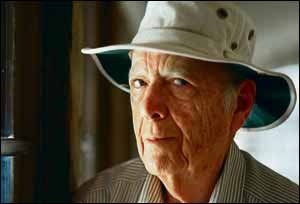|
PROFILE Herman Wouk reflects on his 100 years in shortest book | |
SOMETHING like 50,000 Americans are 100-years-old or more - including Herman Wouk.
The prolific novelist and playwright has brought out what is probably his shortest book, Sailor and Fiddler: Reflections of a 100-Year-Old Author - not strictly a memoir, it is more a rambling essay about his writing life. Even if you haven't read any of Wouk's 20-plus books or plays, chances are you've heard of The Caine Mutiny (1951), which adapted into a 1954 film starring Humphrey Bogart as Captain Queeg. It was his breakthrough work and won him the 1952 Pulitzer Prize. In Marjorie Morningstar (1955), he wrote a coming-of-age novel about a Jewish woman who some saw as pushing the feminist envelope. For a change of pace came the non-fiction This is My God (1959). Other blockbusters included The Winds of War (1971) and War and Remembrance (1978), both of which were adapted for television. Wouk continued to write through to his epistolary novel, The Lawgiver, in 2012. When you put him up against American Jewish contemporaries such as Saul Bellow, Norman Mailer and Philip Roth, what makes Wouk stand out is his unabashed Jewishness. He does not write from a place of alienation, irony or ignorance. The author keeps kosher and goes to shul. "The core of Judaism is right conduct to other people," he wrote in This is My God. "The core of a nuclear reactor, or of an apple, or of a religion, is not all of it." He first went to Israel on a junket in 1955, making his way to Jerusalem along the "crooked Latrun bypass". A son of the Diaspora, he would return regularly, champion the cause of the Jewish state, yet also recall what his "hardheaded mama" told him: "Israel is an inspiration but it fades." Nonetheless, one of his children made aliya. Paradoxically, perhaps, Wouk was encouraged in his career by Southern novelist and screenwriter Calder Willingham, who lauded Marjorie Morningstar as the first major novel about contemporary American Jewry. Nothing forces a reader to sit up and pay attention as to what course of life is best like the realisation that the advice is coming from a writer who has little time left. Here's some of what Wouk figured out, as described in this centennial work: Always keep busy. Find a lover. His lasting love was Betty Sarah Brown - wife, agent and strong-willed muse. Never rest on your laurels. Keeping busy served as "the anodyne of anodynes" after the dreadful loss of his first-born son Abe in a swimming-pool accident. The energy from that tragedy fueled Marjorie Morningstar. Don't become complacent. And don't waste time. Wouk recalls his grandfather telling him: "Lord Rothschild has a clock that struck the hour by booming, 'One Hour Nearer Death!' I have a haunting conscience about wasted time." His advice for aspiring novelists: Work to hold the attention of your readers above all; craft your work so that the humanity of the characters shines through. As for technique and structure: "I groped to it, and that is more or less how I have written my novels." Some of Wouk's books didn't take off immediately, while uppity critics received others with disdain. Yet best-seller usually followed best-seller. Wouk is frank about enjoying his wealth, which bought him a string of homes - overlooking Manhattan's Central Park, on the Caribbean island of St Thomas and, most happily, in Washington's Georgetown suburb. His Israel novels, The Hope (1993) and The Glory (1994), along with his Second World War novels, were meticulously researched. His 'main task' in War and Remembrance, he writes, was to bring "the Holocaust to life in a frame of global war". For readers familiar with Wouk's oeuvre, Sailor and Fiddler reveals his sources and inspirations. "Wherever in my works I have written of death it has been, in one way or another, about Abe," he wrote. Inside, Outside was a kaddish for his father. This is My God was inspired when his cheeky taxman asked him to recommend "something about Chanucah that I can give to my son - purely for culture, you understand, not for religion". The impetus for The Winds of War and War and Remembrance was a meeting with Raul Hilberg, author of The Destruction of the European Jews. Art historian Bernard Berenson inspired the Aaron Jastrow character, while Daniel Gallery was a composite for Pug Henry. Wouk grew up in the Bronx as a 'cormorant' consumer of books, everything from Mark Twain to Alexander Dumas. "Without giving it any thought I was finding my calling; I would be a writer, what was more a funny writer, nothing else." He began his career writing jokes for radio personality Fred Allen. The funny stuff was interrupted by service in the navy during the Second World War. Along the way he rubbed shoulders with movie stars (Henry Fonda), presidents (Lyndon Johnson), Nobel Prize winners (SY Agnon), Israeli prime ministers (David Ben-Gurion) and Israel's post-1967 vanguard dove (Arie 'Lova' Eliav). Wouk describes himself as a cheerful centenarian. Occasionally, he speaks directly to his "faithful reader". Some of his vocabulary is delightfully old school: There's a funnyman who was "a Manhattan smoothie" and an agent who's a "panjandrum". He has little patience for people "long on connections but short on talent". The "sailor" in the title is connected to his pivotal navy experience and the fiddler to his Jewish essence. This is not a tell-all book. Wouk will leave it to his children to decide whether to publish his voluminous "frank private diary". As far as he's concerned: "I have said my say and done my work." (Jerusalem Post) Elliot Jager is the author of The Pater: My Father, My Judaism, My Childlessness.
|
